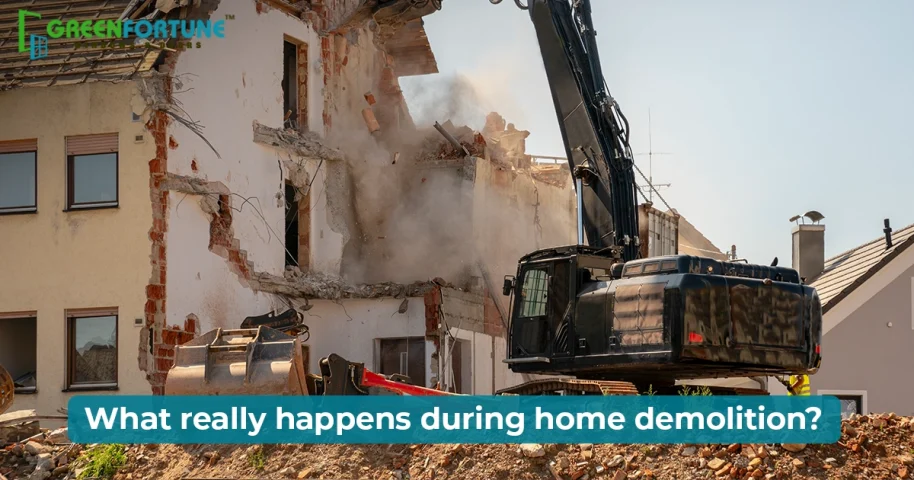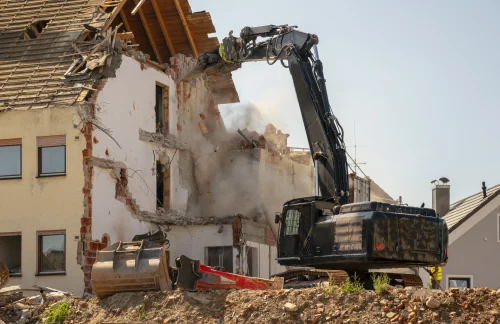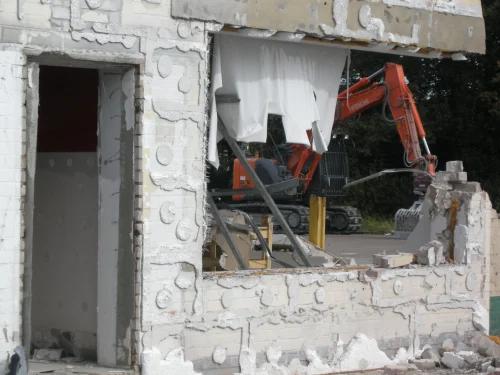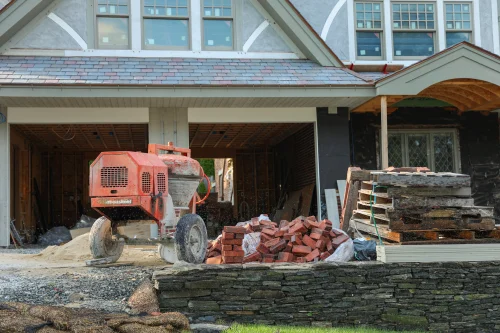
Everything You Need to Know About Pneumatic Caissons
May 2, 2025
A Comprehensive Guide For Understanding the Methods & Types of Concrete Curing
May 2, 2025If you're planning to take down an old property and start fresh, understanding the process of home demolition in India is crucial. Whether you're clearing the space for renovation, resale, or rebuilding from scratch, the rules, costs, and procedures are far from simple.
This guide will walk you through everything—from legal permissions to environmental factors—so you’re fully prepared for the road ahead.
Let’s dive into it.
What is Home Demolition?
Home demolition is the process of dismantling or destroying a building to clear land for new construction, redevelopment, or renovation purposes. In India, this can involve the demolition of residential buildings, whether they are old, damaged, or being redeveloped to meet modern needs.
There are several methods used for home demolition, including:
- Manual Demolition: A more traditional method, where workers dismantle parts of the structure manually.
- Mechanical Demolition: Involves the use of heavy machinery like excavators or bulldozers to bring down buildings.
- Explosive Demolition: Uses controlled explosions to collapse structures, mainly employed for larger, more complex buildings.
Each method has its pros and cons, and the choice depends on the size of the building, the location, and the desired speed of demolition.
Legal Considerations and Permissions for Demolition
Before swinging the sledgehammer, there’s paperwork to sort out.
Key Legal Requirements:
Requirement | Description |
Municipal Permission | Most municipalities (e.g., BMC in Mumbai, DDA in Delhi) require a demolition permit. Without it, demolition is illegal. |
NOC from Utilities | You need NOCs (No Objection Certificates) from the electricity board, water supply department, and gas connection provider. |
Structural Audit | If the property is shared (like a society or apartment), a structural audit is usually mandatory before approval. |
Pollution Control Clearance | In many cities, especially metro areas, pollution boards must approve demolition to ensure dust and debris control. |
Legal Ownership Documents | You must prove that you own the land and structure, especially in cases of joint ownership or inherited property. |
In many cities, the Pollution Control Board also mandates measures to control dust and debris.
Tip: If your house is part of a society or shared property, get written consent from co-owners or the society board.
Steps Involved in Home Demolition
The process of demolishing a home is multi-faceted and involves several phases to ensure safety, environmental sustainability, and compliance with legal regulations.
Step 1: Site Assessment and Evaluation
Before any physical work begins, a thorough evaluation of the property must be conducted. This includes:
- Structural Integrity Check: Assess whether parts of the structure can be salvaged.
- Surveying the Site: Measure the structure and identify any surrounding risks, such as utilities like electricity lines, water pipes, or nearby properties.
- Risk Assessment: Identify potential hazards like asbestos, lead paint, or unstable walls.
Step 2: Obtaining Permits and NOCs
As mentioned earlier, obtaining the necessary permissions is critical. You will need to apply to the local authorities, and once approved, you can move forward with the demolition.
Step 3: Preparing the Site
- Safety Measures: Barricades and safety nets are set up around the demolition site to protect workers and passersby.
- Utility Shutdown: All utilities, like electricity, gas, and water, are disconnected before demolition.
Step 4: Demolition Work
Depending on the method of demolition chosen, work begins with either manual dismantling, mechanical demolition, or explosive demolition.
Step 5: Site Cleanup and Waste Disposal
Once the building is demolished, the debris must be cleaned up, sorted, and disposed of. Recyclable materials like metal and concrete are separated, while non-recyclable waste is disposed of under local regulations.
How Much Does Home Demolition Cost in India?
The cost of home demolition in India can vary significantly based on several factors, including the method of demolition, the size of the building, and the location. On average, the cost of demolish home ranges between ₹50,000 to ₹5,00,000, depending on these factors.
Key Cost Factors:
- Size of the Property: Larger homes or multi-story buildings will cost more to demolish.
- Method of Demolition: Mechanical or explosive demolition is typically more expensive than manual demolition.
- Location: Demolition costs in metro cities like Delhi, Mumbai, or Bengaluru tend to be higher due to higher labour and machinery costs.
- Waste Disposal: If there is a large amount of waste generated, the disposal costs can increase.
Example Cost Breakdown:
Demolition Type | Cost per sq. ft. | 1000 sq. ft. Estimate |
Manual | ₹25 – ₹40 | ₹25,000 – ₹40,000 |
Mechanical | ₹45 – ₹80 | ₹45,000 – ₹80,000 |
Controlled (Urban) | ₹100 – ₹150 | ₹1,00,000 – ₹1,50,000 |
Additional Charges:
- Machinery rental (JCBs, dump trucks): ₹5,000–₹10,000/day
- Debris disposal: ₹2–₹5/kg
- Labor insurance & safety gear: ₹3,000–₹10,000
- Permit charges (varies by city): ₹5,000–₹20,000
Pro Tip: Negotiate with your contractor on salvage value for recyclable materials like steel, wood, and bricks—it can reduce total cost by up to 15%.
Key Impacts to Consider
Demolishing a home isn’t just a construction activity—it affects air quality, water systems, and even local biodiversity if not managed well.
Health Considerations:
- Dust and Air Pollution: The demolition process can create dust, which can harm respiratory health if not properly managed. Using water sprays and dust barriers can mitigate this risk.
- Toxic Materials: Older homes may contain hazardous materials like asbestos or lead-based paint, which require special handling during demolition to avoid exposure to toxic substances.
Environmental Considerations:
- Waste Management: Proper sorting and disposal of waste is crucial. Recyclable materials such as metal, wood, and concrete should be separated and reused wherever possible.
- Noise Pollution: Demolition work can be noisy, especially when using heavy machinery. It is essential to ensure that demolition work is carried out during permissible hours to minimize disturbance to neighbors.
- Ecological Impact: In certain areas, demolition may have an impact on local wildlife or heritage structures. Permissions are often required to assess such ecological impacts.
Real-World Example: In 2023, a family in Bengaluru decided to demolish their 30-year-old house to build a modern duplex. By hiring a certified demolition contractor and recycling 60% of their debris (especially bricks and steel), they reduced their demolition cost by ₹20,000 and got a fast-track permit due to their eco-friendly approach.
Final Thoughts
House demolition might seem like a big task, but with the right approach, it can be a smooth and straightforward process. With legal clarity, professional help, and sustainable practices, how to demolish a house no longer needs to be a headache. Instead, it becomes the first exciting step toward your next dream home.
Whether you're demolishing an old home for a new project or simply clearing the way for something else, the right planning and professional help can make all the difference. Just remember to do your homework, follow the rules, and work with a trusted team to get the job done right.
Redesign Smart with Green Fortune
Once the old walls come down, your new home deserves windows and doors that match modern, eco-friendly living. Green Fortune offers UPVC windows and doors that keep your home cool, soundproof, and energy-efficient.
Whether you’re going for a minimal look or full luxury, start with their customized options built for Indian climates. Visit Green Fortune to explore premium, weatherproof, and aesthetic window and door solutions.
FAQs
- What’s the safest method for demolishing an old home in a tight city lane?
Controlled demolition using small machinery and manual labor is safest for congested spaces. It prevents structural damage to nearby buildings and keeps dust under control. Always consult a licensed demolition contractor for such jobs.
- Can I sell my home’s debris?
Yes, many demolition contractors will buy usable debris like steel rods, wooden beams, or intact bricks. This can offset part of your demolition cost. Ensure that salvage rights are included in your contract.
- Is a demolition notice required for tenants or neighbors?
Absolutely. If the property is rented or in a residential area, tenants and neighbors must be notified in advance. This helps prevent legal disputes and ensures everyone’s safety during demolition.







